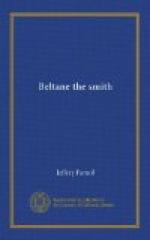“Aye, forsooth,” quoth Sir Brian, “they press their attack amain, for one that falleth, two do fill his place.”
“Verily, and what fighting man could ask more of any foe? And we be fighting men, praise be to Saint Cuthbert—”
“Aye,” quoth Roger, crossing himself, “Saint Cuthbert be our aid this night.”
Forthwith Beltane formed his column and with Ulf and Roger beside him marched from the square. By narrow streets went they, ’neath dim-lighted casements where pale faces looked down to pray heaven’s aid on them.
So came they where torch and lanthorn smoked and gleamed, by whose fitful light they beheld a barricade, rough and hastily contrived, whence Sir Benedict fought and Walkyn smote, with divers of their stout company and lusty fellows from the town. Above, upon the great flanking tower of the gate, was Giles with many archers who plied their whizzing shafts amain where, ’twixt outer and inner wall, the assailants sought to storm the barricade; but the place was narrow, and moreover, beyond the breach stout Eric, backed by his fierce townsmen, fought in desperate battle: thus, though the besiegers’ ranks were constantly swelled by way of the breach, yet in that confined space their very numbers hampered them, while from sheltered wall and gate-tower Giles and his archers showered them with whistling shafts very fast and furious; so in that narrow place death was rife and in the fitful torch-glare was a sea of tossing steel and faces fierce and wild, and ever the clamour grew, shouts and screams and cries dreadful to be heard.
Now as Beltane stood to watch this, grim-lipped, for it needed but few to man the barricade, so narrow was it, Roger caught his arm and pointed to the housetops above them; and what he saw, others saw also, and a cry went up of wonder and amaze. For, high upon the roof, his mail agleam, his white robe whiter in the torch-glare, stood Friar Martin, while crouched behind him to left and right were many men in ancient and rusty armour, men grey-bearded and white of head, at sight of whom the roar of battle died down from sheer amaze until all men might hear the friar’s words:
“Come, ye men of Belsaye!” he cried, “all ye that do love wife or daughter or little child—all ye that would maintain them innocent and pure—follow me!”
As he ended, his sword flashed, and, even as he sprang, so sprang all those behind him—down, down they leapt upon the close-ranked foemen below, so swift, so sudden and unexpected, that ere they could be met with pike or sword the thing was done. And now from that narrow way, dim-lit by lanthorn and torch-glare, there rose a sound more awful to hear than roar of battle, a hoarse and vicious sound like to the worrying snarl of many great and fierce hounds.
With ancient swords, with axe and dagger and fierce-rending teeth they fought, those fathers of Belsaye; thick and fast they fell, yet never alone, while ever they raved on, a company of madmen, behind the friar’s white robe. Back and back the besiegers reeled before that raging fury—twice the white friar was smitten down yet twice he arose, smiting the fiercer, wherefore, because of his religious habit, the deathly pallor of his sunken cheek and the glare of his eyes, panic came, and all men shrank from the red sweep of his sword.




